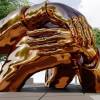This week, The Embrace monument will be unveiled on Boston Common, to honor the Rev. Dr. Martin Luther King Jr. and Coretta Scott King's time in Boston.
As a minister, King earned his doctorate in systematic theology at Boston University. Many Sundays, he would preach at Twelfth Baptist Church in Roxbury, and his soon-to-be wife would come to watch.
“She was invited by her classmate, Sister Mary Powell,” said senior pastor the Rev. Willie Bodrick II. He and associate pastor the Rev. Jeffrey Brown, who is also a co-chair of Embrace Boston, say they are keeping King’s legacy alive at Twelfth.
One of the first books Brown received as a child was a book of sermons by King, he said.
“I was 5 years old when Dr. King was assassinated,” Brown said. “What is important for me about his approach and his sense of spirituality is how he tied it to the everyday lives of Black people, but people in general, and at the end of his life, this turn towards economic empowerment. And so for me, what we are doing now is picking up the mantle on that.”
Bodrick, who was raised in Atlanta, said he grew up knowing that he and King shared common threads in their lives.
“I'm from the same city, born and raised, from the same community, from the same tradition. Both of us were PKs, preacher's kids,” he said. “That was a part of my upbringing.”
He grew up going to the King Center in Atlanta, which houses King’s archives and sermons. It was common, he said, for him to listen to those sermons and analyze his work.
“When you look at King as a preacher, he was a technician,” Bodrick said. “King was very well-read, which is something that I think allowed him to have such a broad impact, and be able to engage audiences even that differed or disagreed with him. But he had his own cadence. He had his own voice. And I think of the best of the tradition, he was able to speak to the depths of who we were as a people and speak honestly about that, but also be able to speak to a nation who needed to hear from the Black church tradition.”
The need for that persists, Bodrick said.

“That, for me, is still what's necessary in our country today,” he said. “That's what undergirds me. I think that willingness to still speak truth to power and to know that out of the womb of the Black church, there is a word for this nation: Daring to dream and utilizing the pulpit for healing and the healing of this nation.”
Bodrick and Brown both said they strive to bring King’s ideals of community and service into their church today. They spoke of working to feed people in the early days of the COVID-19 pandemic and lockdowns, when many suddenly lost their jobs; of addressing housing insecurity with church funds; of advocating for social issues, such as police accountability; of teaming up with Boston Medical Center and turning the church’s Hester Hall into a vaccine clinic once COVID-19 shots became available.
“One of the things that Dr. King was always fighting for was the most vulnerable, utilizing his Christian faith to make real the opportunity, the access, the justice that was necessary, which is deep to all of us in this community,” Bodrick said.
The Embrace is on the Boston Common, about 2 miles from Twelfth Baptist Church on Warren Street in Roxbury. It’s near a spot where King spoke after a 1965 march from Roxbury to the Boston Common, but far — in terms of physical distance and disparities — from where he spent much of his time in Boston.

“It's important for The Embrace memorial to be where it is,” Brown said. “Boston Common is the oldest park in the United States, and for many, many years it was a symbol of the rise of the United States of America. And oddly enough, all the memorials embraced white America. Even the Massachusetts 54th Memorial is really a memorial of Robert Gould Shaw, and the Black soldiers are just the background. But now we have a memorial that is being placed in the Common that is more reflective of what we see in this city.”
“I'm really excited about the fact that there is some symbolic progress that's being made,” Brown added. “But if it's just symbols, then it really defeats the purpose of what King was really all about.”
Bodrick noted that King was assassinated “in an unfavorable time.”
“He's not loved by America because he's speaking out against the war and he's fighting for poor folk,” Bodrick said. “And so I think for us, we must make real The Embrace. Not just to be a symbol hearkening back to something that was and to a dream that was, but how do we make real what can happen right now in this city? Recognizing that the dollars of tourism need to flow into Roxbury, making sure that from Warren Street, from Washington Street, from MLK Boulevard, past Melnea Cass, all the way down into The Common, that there is the same prosperity and opportunity for every family, for every child, and for every community in the city of Boston.”
“Symbols,” Bodrick said, “only have meaning to those who use them to spur, hopefully, development and ideas that address the ills of the people.”
GBH News Reporter Mark Herz contributed to this story.








